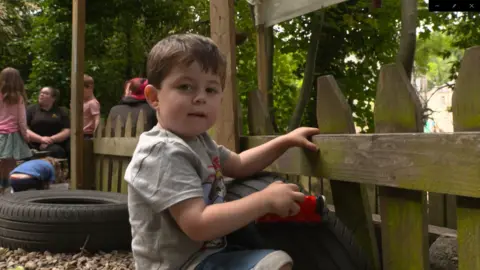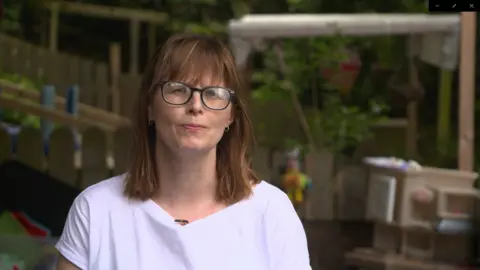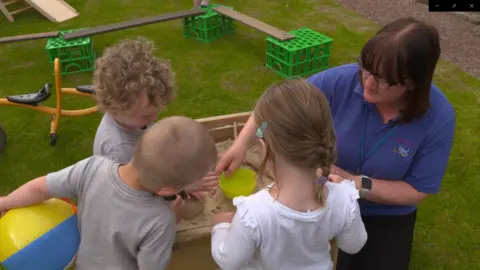Nurseries in England: Parents asked about proposed change to carer ratios
 AIDAN BLACK/BBC
AIDAN BLACK/BBCPlans to let nurseries and childminders look after more two-year-olds in England are to be put to parents.
In England, one adult can be in charge of four children, but the government says it wants to lower the cost for parents by following the Scottish model of one adult caring for five toddlers.
Most nurseries say the systems cannot be compared and do not want the change.
A mum who has spent more than £90,000 in nursery fees in seven years doubts a change would save parents much money.
The consultation into the idea is expected to take eight weeks.
Will Quince, the children and families minister, said it was about offering flexibility to early years settings and that he did not want to do anything that "compromises quality or safety".
He told the BBC the Scottish model was a good one and "it's only a slight tweak or variation to what we do".
"But that's exactly why we are consulting because we've got to listen to the sector and, importantly, listen to parents to make sure that whatever we propose we are getting it right." he added.
Mother-of-two Amanda Smallbone, whose younger child attends a Durham nursery, says that as a working parent she already felt guilty about putting her children in someone else's care.
But that means she wants them to have the best experience and "part of that is being part of a smaller group and having that additional care".
Amanda questions how big the savings would actually be. She believes using the new ratios could create a two-tier system for parents - those who can afford paying for the extra costs of lower ratios and "those who have to be driven by price as they have no other choice".
A full-time nursery place for a child under two now costs, on average, more than £14,000 a year in the UK, Coram family and childcare's recent annual survey found.
In a separate interview with PA news agency, Mr Quince said other countries "put far more money into early years' education" - but people "pay a lot more in tax".
Bridget Phillipson, Labour's shadow secretary of state for education, called the announcement "pathetic".
"Tweaking ratios is not the answer parents want and not the answer children need," she said.
She added that Labour would introduce a "fourfold increase" in the early years pupil premium, which is funding given to early years providers for disadvantaged three and four-year-olds.
 AIDAN BLACK/BBC
AIDAN BLACK/BBCMost nurseries and pre-schools in England are opposed to the ratio changes and say the plans will not cut costs for parents.
Dr Kate Jones, the owner of Yellow Wellies Day Nursery in Durham, says they probably would not adopt the new ratio, even if the plan was approved.
She says the proposal is about "reducing quality" for two-year-olds who are just learning how to do things for themselves.
"At lunchtime we have allergies, we have choking risks and usually we have some kind of toileting emergency and that is just with four of them," she says.
With the nursery trying to retain its best staff and cope with a much larger electricity bill, Dr Jones adds that for parents "the reduction in fees would not be a reduction, but maintaining at best".
Scottish model
At Little Flyers nursery in Broxburn near Edinburgh, one adult can look after five two-year-olds.
Pamela Stein, the learning and development manager, says it is vital that staff have the right skills and resources to be able to provide "a safe nurturing experience".
She says all their practitioners must complete a certain amount of training every year to maintain their obligatory registration with the Scottish social services council and help ensure that adult-to-child ratio remains safe.
 AIDAN BLACK/BBC
AIDAN BLACK/BBCThe National Day Nurseries Association, which has members in England and Scotland, says the two systems cannot be compared.
It says that in Scotland:
- more staff have at least a level three qualification in childcare (84%) compared with England (76%)
- nurseries receive on average more funding per child from local authorities
- the nurseries are exempt from business rates
- a larger proportion than in England are run by the local councils, where costs are different
Support for childminders
Eva Lloyd, a professor of early childhood at the University of East London, who co-authored a research report on the costs of childcare in 2013 when the ratio change was being considered by the coalition government, says it is "a dangerous move" that won't benefit parents, children or the sector.
She says the measures being proposed will not make any difference "until and unless we absolutely address workforce paying conditions head on".
"We have the most serious recruitment and retention crisis in childcare employees than we've ever had as far as records go, and my prediction would be that even more will leave," she added.
Meanwhile, the government also says it hopes to increase the number of childminders by allowing them to work from a local community centre or village hall rather than their own home.
It says it is working with Ofsted to make it easier for childminders to register and to reduce inspections. The early years foundation stage framework they are expected to follow will be reduced as well.
A new drive to target parents who are not taking up existing childcare offers has also been announced.

Are you a nursery worker or parent? Share your experiences by emailing [email protected].
Please include a contact number if you are willing to speak to a BBC journalist. You can also get in touch in the following ways:
- WhatsApp: +44 7756 165803
- Tweet: @BBC_HaveYourSay
- Upload pictures or video
- Please read our terms & conditions and privacy policy
If you are reading this page and can't see the form you will need to visit the mobile version of the BBC website to submit your question or comment or you can email us at [email protected]. Please include your name, age and location with any submission.
